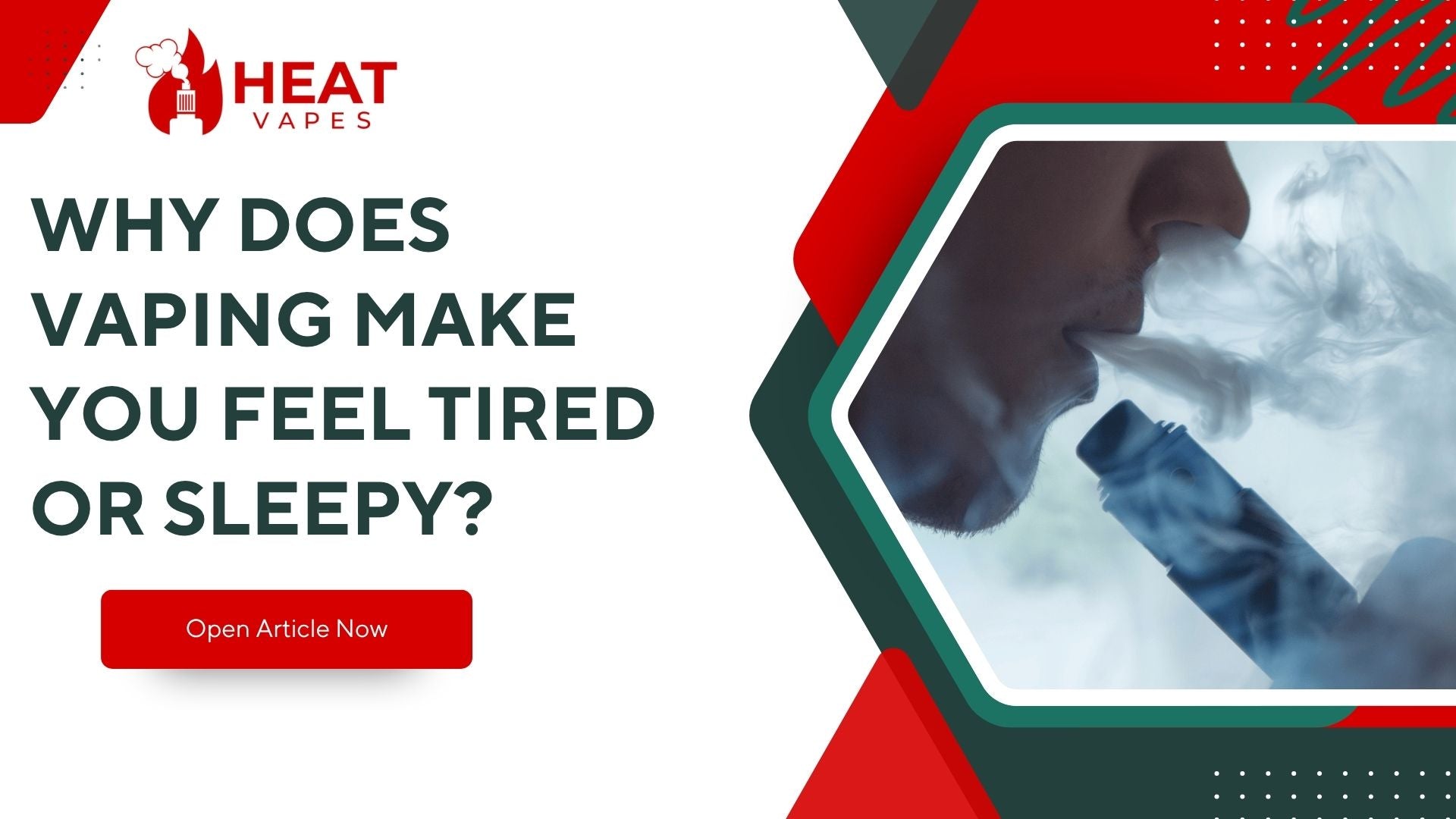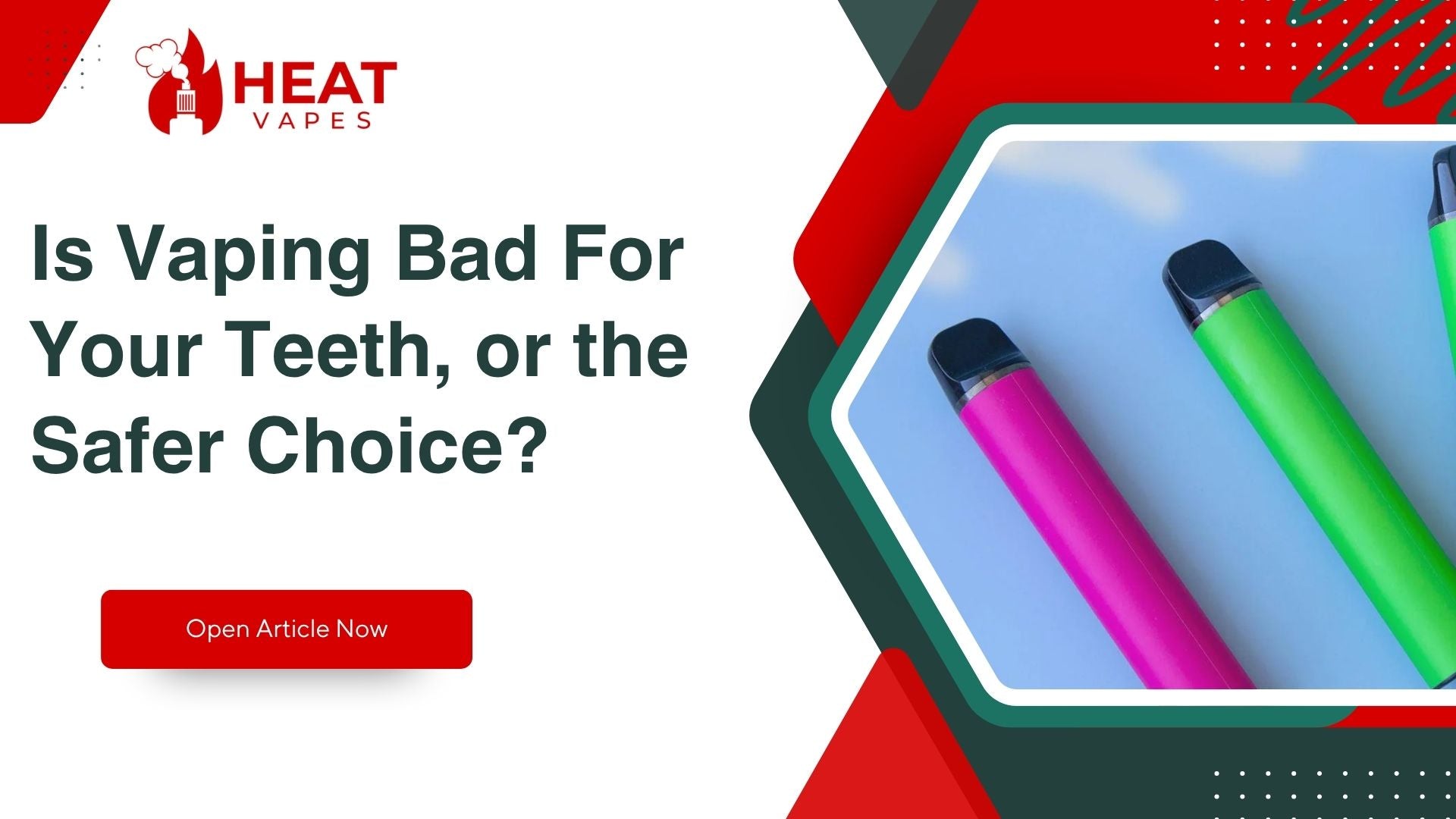
If you’ve ever wondered if your vaping has an effect on your blood pressure—congratulations, you’re at the right spot—we know it's not a relaxed question. Blood pressure has to do with stress, heart health, and wellness - generally speaking. Let's clarify Does Vaping Increase Blood Pressure?, simply, like humans like to do.
How Nicotine Behind the Clouds Pushes Your BP Up?
To begin with, the majority of traditional vape devices have nicotine in them, which is a stimulant that increases the release of adrenaline. Each time there is an adrenaline release three main actions take place within the body: a spike in heart rate, tightening of blood vessels, and increase in blood pressure.
If you've ever taken a drag on your vape device and have felt an immediate increase in your heart rate, then this is surely what's happening.
For a healthy young person, the occasional few bpm spike in heart rate might not feel threatening and is negligible, but every vape puff, every day, all day long? All those tiny spikes add up over time.
Timing Matters: Blood Pressure Spikes, Then Gradually Settles
That rush of adrenaline doesn't carry on for an infinite amount of time. Typically, it hits you quickly and leaves in a manageable 20–30 minutes—unless you are taking puff after puff with no pause.
It is then that the spikes start to blur into one another, keeping your body in a higher-pressure state and preventing any resetting.
To clarify the changes your body goes through when you vape, consider measuring your blood pressure before vaping, and then 20 minutes later. Repeat this for a few days and collect the data. You may be surprised at how consistently those temporary spikes are.
Less Nicotine Doesn’t Always Mean Safer
Many folks say, “Easy—just switch to nicotine-free e-liquid.” That can help reduce those adrenaline surges, yes. But remember, biodegraders like PG, VG, and flavour compounds are still inhaled.
We already know that inhaled vapour includes fine particles—some of which may trigger mild inflammation or allergic responses over time.
With zero nicotine, the biggest risk to blood pressure might reduce—but that doesn't erase all potential concerns. Especially if someone is using cheap or untested juice.
How Vaping Compares to Smoking Cigarettes (Spoiler: It’s Less Harmful)
If we stack vaping against traditional smoking, the difference is clear: smoking is far worse for vessels, inflammation, and arterial stiffness. But vaping isn’t benign. Nicotine is still at play, and it’s cumulative.
People who’ve quit smoking using vaping often reduce their overall blood pressure—but some continue to vape and see lingering elevated readings. It’s definitely the lesser of two risks—but not zero risk.
Blood Pressure Isn’t Just About Vaping
Let’s get real: our blood pressure responds to all kinds of stressors. So to answer: Does Vaping Increase Blood Pressure?
If you're grabbing ten puffs a day but also juggling shift work, coffee, skipping sleep, eating too much salt, and barely moving, vaping might feel like the bad guy, but it’s only one part of a bigger equation.
The better approach? Take a look at the whole picture:
-
Are you drinking enough water?
-
Staying active?
-
Sleeping well?
-
Managing stress?
Even swapping just one caffeinated drink for water or stretching daily can help your body counteract small BP spikes.
Signs That Blood Pressure May Be Rising
You might not always feel changes, but sometimes your body gives little signals:
-
Occasional headaches—not mild, but lingering
-
Feeling dizzy or light-headed
-
Heart palpitations
-
Shortness of breath during light activity
Those are signs. If they show up regularly, it's worth checking in with a healthcare provider—even if tests come back “normal.”

What You Can Do If You Vape and Are Concerned
You don’t have to quit suddenly. Here’s a practical, gradual way to cut down:
-
Track how often and how much nicotine you’re using
-
Try lower-nicotine blends over time
-
Schedule “vape-free windows” where you delay the session
-
Keep your device clean and replace coils regularly
-
Stay physically active and monitor your general health
Small shifts can add up. Even cutting nicotine from 12mg to 6mg, and getting into the habit of taking vape breaks, lowers risk.
When to Call in Help
If you have personal risk factors—like a past of hypertension, family history of heart disease, diabetes, or you're over 40—it’s super smart to talk to a GP. They can guide you on safe limits or alternatives like nicotine patches or lozenges that won’t spike your blood pressure as sharply.
Your doctor can also suggest heart-healthy routines—maybe renal monitoring or lifestyle coaching to support your continued wellness.
Why We Care at Heat Vapes
We started Heat Vapes in Manchester with a simple mission: to offer quality vaping gear to adult users, but not blind to health considerations.
We don’t manufacture anything. We pick products from reputable brands that take ingredient testing seriously. Health always comes first, even in a habit like vaping.
That’s why we stand by informed choices and try our best to guide you on Does Vaping Increase Blood Pressure? topic—especially around topics like blood pressure that quietly influence so much, day after day.
It’s Not Just What You Vape — It’s How Often You’re Reaching for It
We get it — for many, vaping is more than just a habit; it’s a break, a breather, a comfort cue.
But if you find yourself reaching for your vape every 15 minutes without really thinking, that might be your body telling you something else is off — maybe stress, boredom, or even habit layering.
The truth is, blood pressure doesn’t just rise because of the chemicals. It rises when we condition our bodies to live in a constant state of low-level alert.
Even cutting down your sessions to just after meals or during specific times of day can give your system the breathing room it needs to recalibrate.
Health Check: Does Vaping Increase Blood Pressure Long Term?
At Heat Vapes, we get a lot of questions from regular customers and first-time buyers alike — and one that comes up time and time again is this: "Does Vaping Increase Blood Pressure over time?" It’s a valid concern.
Whether you’ve just quit cigarettes or are considering vaping as your go-to, understanding how it might affect your health in the long run is something we should all be taking seriously.
Let’s unpack it — clearly, thoroughly, and without trying to scare you. We’re not here for panic or sugarcoating. Just honest, up-to-date insights.
What’s Really Behind the Blood Pressure Spike?
Let’s not dance around it nicotine is the central piece of this puzzle. It’s a stimulant, which means that every time you take a puff of a vape containing nicotine, your body gets a bit of a jolt.
Your heart beats a little faster, your blood vessels tighten, and your blood pressure rises even if only slightly at first. This might not seem like a big deal after one or two puffs. But if you’re reaching for your vape regularly throughout the day, your body starts to adjust to these spikes.
And over time, what was once a brief rise in pressure can become a new normal, especially if you’re vaping high-strength nicotine or using it consistently throughout the day.
Is Vaping as Bad as Smoking for Blood Pressure?
This one’s tricky — and it depends on a few things. On one hand, research has shown that vaping is generally less harmful than traditional smoking when it comes to long-term cardiovascular health.
Cigarettes contain a cocktail of harmful chemicals that do serious damage to the heart and blood vessels, and many of those don’t exist in vape juice.
But that doesn’t give vaping a free pass. Nicotine still does what nicotine does. And suppose you’re switching from smoking to vaping but keeping your nicotine levels the same — or even higher (which some people do without realizing it).
In that case, the pressure on your cardiovascular system might not drop as much as you’d hope. So, yes — vaping might be “less bad,” but it’s not necessarily “safe” when it comes to blood pressure.
What About Nicotine-Free Vapes?
Now this is where things get interesting.
If you’ve moved on to nicotine-free e-liquids, your blood pressure probably won’t be affected in the same way. You’ve taken the main stimulant out of the equation. But that doesn’t mean you’re totally off the hook either.
Even without nicotine, the act of vaping means you’re inhaling aerosolised chemicals — most commonly propylene glycol, vegetable glycerin, and flavourings.
While these are considered safe to eat, we’re still learning about how they affect the body when inhaled daily over long periods. Some research suggests they may trigger inflammation in the lungs and blood vessels, and inflammation can lead to higher blood pressure over time too.
It’s Not Just About the Vape – It’s About the Whole Picture
One thing that gets lost in the shuffle of Does Vaping Increase Blood Pressure? is how vaping fits into your overall lifestyle.
Think about it: if you’re vaping while sitting at a desk all day, staying up late, stressing over deadlines, drinking a lot of caffeine, and skipping meals — that adds up. Blood pressure isn’t just about one habit; it’s about the whole ecosystem of how you live, eat, sleep, and move.
Vaping with nicotine might be a contributing factor, but it’s rarely acting alone. So if you’re concerned about your blood pressure, it’s worth stepping back and looking at the full picture.
How Do You Know If It’s Affecting You?
Here’s the thing — high blood pressure doesn’t always shout for attention. It’s called the “silent killer” for a reason. But there are a few signs that your body might be under a bit more pressure than it should be:
-
You’re more tired than usual, even after sleeping
-
You get a dull headache first thing in the morning
-
You feel slightly short of breath after light activity
-
Your heart feels like it’s working harder than it should — even at rest
Of course, these can mean lots of things — but they’re worth watching, especially if you vape frequently.
So What Can You Do About It?
If you're concerned about blood pressure and still want to vape, here’s what we’d suggest:
-
Start lowering your nicotine strength over time. You don’t need to go cold turkey overnight, but stepping down gradually can reduce stress on your heart.
-
Time your vape sessions, so you’re not reaching for it constantly. Treat it like a ritual — not a crutch.
-
Drink more water. Seriously. Nicotine acts as a mild diuretic, and dehydration can make everything worse.
-
Stay active. Even a daily walk can help keep your blood pressure in check.
-
Check in with yourself. Use a home monitor if you’ve got one — or ask your GP for a quick reading next time you’re in.
We’re Not Doctors — But We Care About Your Health
At Heat Vapes, we’ve never claimed to be medical experts — but we do care deeply about our customers' wellbeing. That’s why we don’t just sell products; we stay up to date on the science and try to share what we learn.
We work with vetted suppliers who meet UK standards, and while we don’t manufacture our own line, we take pride in offering quality gear and liquids we’d feel comfortable recommending to friends and family.
Our goal? To give you the tools to make informed choices — and to offer a place where you’re not judged for your habits, but supported in your journey.
There’s Power in Being an Informed Vaper
We’re not here to shame, scare, or preach — that’s never been our vibe at Heat Vapes. What we believe in is real information that helps real people make better choices.
Whether you're in it for the flavours, the hit, or just the ritual, knowing how your body responds puts the power back in your hands. You deserve to enjoy what you like without wondering if you're compromising your health.
And if blood pressure is something you’re keeping an eye on? Then knowing what’s in your e-liquid and how your body reacts is one of the smartest things you can do.
Vaping May Raise Blood Pressure, But You’ve Got Control
If you're vaping regularly, yes—your blood pressure is probably getting jostled throughout the day. It doesn’t mean disaster, but it does mean awareness.
Stop seeing vaping as just clouds and cravings. See it as part of your body’s equation. And whether you cut back, swap to low-nic or zero-nic, or take breaks, you’re actively reducing blood pressure risk.
We’ll continue offering trusted, carefully selected products—but above all, we support you in understanding the why behind your choices. That’s how vaping can stay a controlled, conscious experience.
Conclusion:
So... does vaping increase blood pressure long term? It can. Especially if nicotine is part of your daily routine and you’re not balancing things out with hydration, movement, and rest. But you’ve got options. You’ve got control. And you’ve got a community behind you.
You don’t have to give up vaping if it’s something you enjoy — just be mindful of how it fits into your bigger picture.
Because at the end of the day, it’s not about perfection. It’s about progress — and knowing your body well enough to take care of it in the ways that matter.
Can You Vape When Pregnant With No Nicotine or Is It Too Risky?











